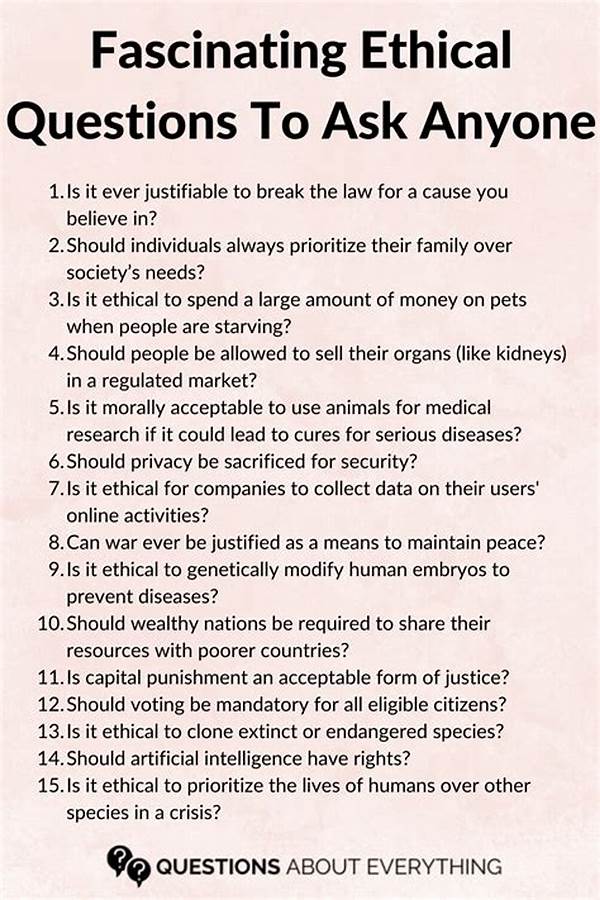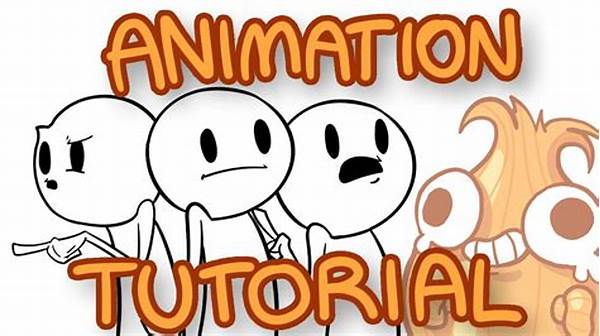In today’s fast-paced digital landscape, where technology and storytelling mesh seamlessly, there’s a unique medium that stands out as both captivating and thought-provoking—animation. More than just a tool for entertainment, animation serves a profound purpose by addressing complex moral dilemmas and societal questions. Imagine delving into the intricate tapestry of human ethics through mesmerizing visuals. Yes, that’s what animation exploring ethical questions can achieve. It’s not just about seeing; it’s about feeling and understanding on a profoundly different level. Prepare to go beyond passive watching and engage in an intellectual and emotional journey that challenges and stimulates your moral perspective.
Read Now : Historical Events Brought To Life Through Animation
The Power of Animation in Conveying Ethics
When was the last time a cartoon made you question your values? If your answer is “never,” it’s time to reconsider the underestimated power of animation exploring ethical questions. From childhood classics to modern animated masterpieces, these narratives possess an innate ability to disarm audiences, making them more receptive to profound themes. Unlike traditional media, animation bypasses preconceived biases. It conveys ethical questions seamlessly, inviting viewers to confront, assess, and even alter their ethical standings. Through colorful characters and imaginative worlds, abstract moral concepts suddenly feel tangible, resonating deeply with viewers across ages and backgrounds.
Imagine watching a vibrant animation where characters are faced with difficult moral decisions. As the plot unfolds, you find yourself rooting for them, questioning their choices, as if their dilemmas were your own. Animation effectively submerges viewers in a universe where ethical questions aren’t just discussed—they’re lived. Through this medium, tackling subjects like justice, equity, and responsibility becomes not only palatable but genuinely engaging.
Transforming Perspectives with Animation
1. Revolutionary Storytelling: Animation exploring ethical questions redefines how narratives are told, using creativity to convey powerful messages invisibly woven into each storyline.
2. Universal Appeal: Regardless of age or background, animation speaks a universal language, making ethical debates accessible to a broader audience.
3. Sublime Emotions: An animated narrative can evoke emotions in ways live-action often cannot, establishing deep connections that underscore ethical complexities.
4. Breaking Boundaries: Addressing subjects often avoided in traditional media, animation goes boldly where others dare not, challenging societal norms head-on.
5. Visually Stimulating Engagement: The aesthetic allure of animation captures and retains attention, while blending edgy questions seamlessly into the visual experience.
Why Must We Embrace This Medium?
Let’s face it: animation isn’t just kid’s stuff anymore. Embracing animation exploring ethical questions is essential for cultivating a more ethically conscious society. This unique medium provides a safe space for viewers to reflect on sensitive topics without feeling attacked or judged. As animation explores ethical questions, it shifts paradigms and encourages dialogue, fostering a world where difficult conversations are normalized and embraced.
Consider this: in our increasingly polarized society, open-minded discourse can become elusive. Yet, during a casual cinematic experience with animation, viewers can find themselves pondering issues they might usually ignore. Animation opens doors to introspection, offering insights and perspectives previously unconsidered. The potent combination of visuals and narrative pulls viewers out of their ideological echo chambers and into a shared space of exploration and discovery.
Animation as a Catalyst for Change
Animation serves as more than a medium—it’s a catalyst. As we immerse ourselves in stories packed with ethical dilemmas, animation exploring ethical questions cultivates empathy and compels us to consider viewpoints beyond our own. Engaging with these narratives humanizes issues, reminding us of our shared humanity despite differences.
1. Ethical Nuance: Characters often display moral ambiguity, reminding us that life is not black and white.
2. Ripple Effects: Animated narratives showcase the consequences of ethical decisions, underscoring the impact of our actions.
3. Engaging with Youth: Animation can reach younger audiences, instigating early awareness and fostering moral growth.
4. Cross-Cultural Conversations: Animation transcends language barriers, engendering global dialogues on universal ethical questions.
Read Now : Golden Globe Animated Movie Winners
5. Innovation in Learning: As a tool for education, it enhances critical thinking, blending learning with entertainment.
6. Reimagining Concepts: Animation portrays ethical concepts in new lights, offering fresh perspectives.
7. Emotional Recall: Animated stories linger emotionally, making ethics memorable beyond the screen.
8. Confronting Biases: It challenges viewers to reassess ingrained biases and consider multiple facets of an ethical issue.
9. Timeless Lessons: Animated tales often hold timeless truths, passed down through generations.
10. Societal Reflection: By mirroring societal issues, it prompts viewers to reflect on real-world ethics.
The Immersive Experience of Ethical Animation
Stepping into the kaleidoscopic world of animation exploring ethical questions is like diving into a pool of a thousand colors, each hue a representation of a moral quandary. The artistry and complexity encapsulated in such animations give audiences more than just a visual spectacle—they deliver an educational experience, compelling them to contemplate and question. Think of it as an endless conversation starter, sparking debates and discussions that ripple through communities.
With each animated narrative tackled, whether it’s the ethical implications of artificial intelligence, climate change, or individual autonomy, viewers find themselves engrossed in both the storyline and the broader questions it poses. This medium turns passive viewers into active thinkers, transforming living rooms into forums of debate, and transcending the traditional boundaries of discussion.
The Future of Storytelling and Ethics in Animation
In a world desperately in need of understanding and compassion, embracing animation exploring ethical questions becomes more than a choice—it’s a responsibility. It breaks chains and paves the way for a renaissance in storytelling, where ethics and entertainment are no longer separate entities but interwoven seamlessly to educate and enchant.
Looking toward the future, the potential for animation to address evolving ethical dilemmas is boundless. As technology advances and access to animation grows, it will undoubtedly remain a pivotal medium for initiating conversations and promoting empathy across divides. By leveraging this powerful tool, we can build a more balanced and understanding society, one animated story at a time.
The Impact of Ethical Animation on Society
Wrapping up, it’s clear that animation exploring ethical questions holds transformative power, influencing hearts and minds alike. As digital narratives continue to evolve, the unique ability of animation to convey ethics will serve as a beacon of enlightenment, encouraging responsible discussions and sensitive considerations around complex topics. Through the vibrant canvas of animation, we can glimpse a world where storytelling and ethics are beautifully intertwined, continuously shaping societal values for the better.



